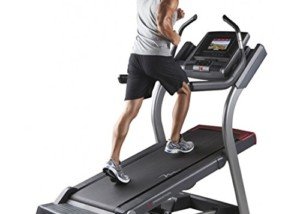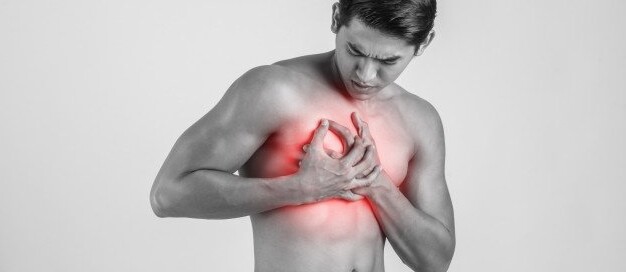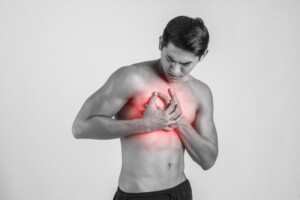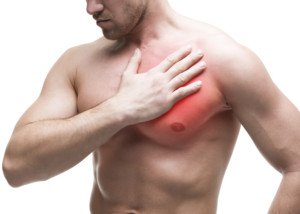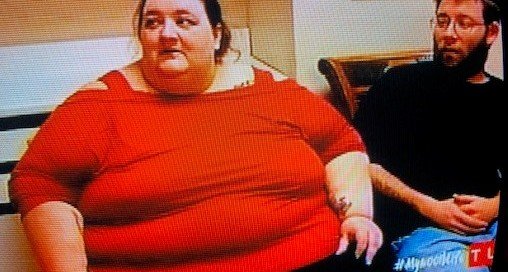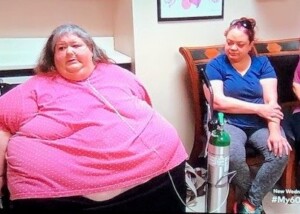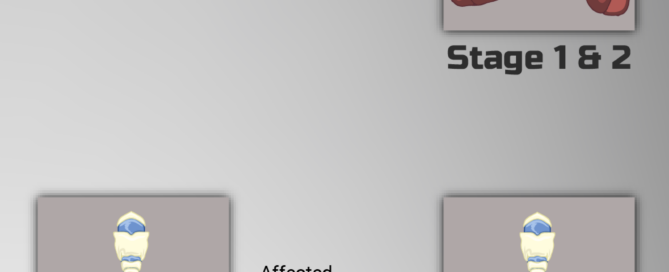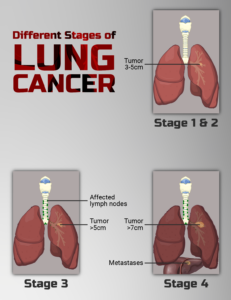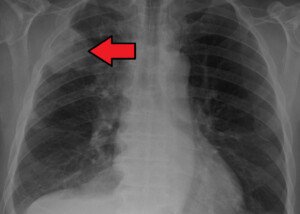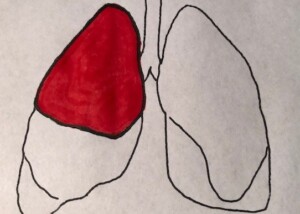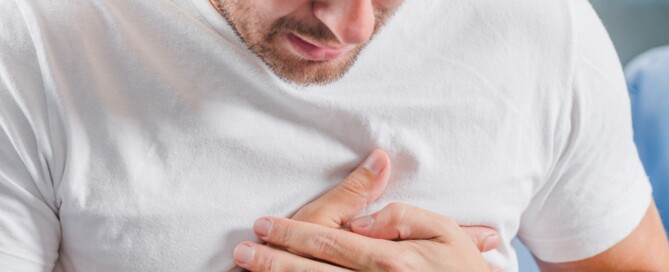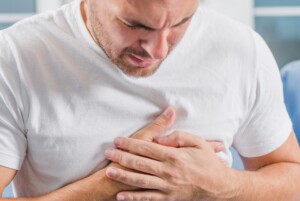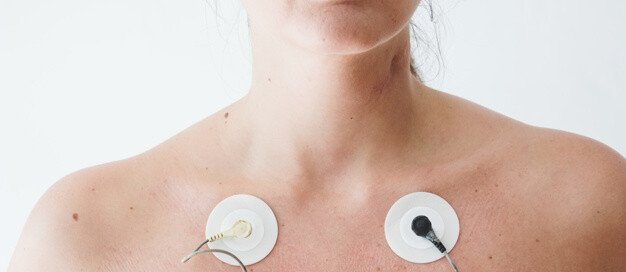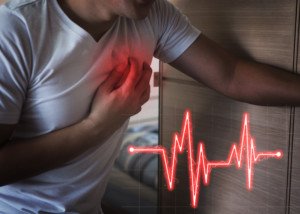Can I Get a Bigger Butt Holding a Treadmill & Leaning Forward?
Many women want a bigger butt and would rather get one by walking on a treadmill and leaning way forward while holding on than by intense weight training. (more…)
Can Holding Onto a Treadmill Build Up Skinny Legs?
Those who are tired of their skinny legs will try anything that comes to mind to build up some mass.
Holding onto a treadmill allows one to “walk” at a high incline and fast speed for sustained periods. (more…)
Pulled Muscle in Chest or Angina? Symptom Comparison
A pulled chest muscle or one that’s suddenly in spasm can hurt a lot or a little – but angina, too, can come in different flavors, ranging from a muffled ache to a sudden severe pain. (more…)
Angie J. of “600 Pound Life” Makes Jeanne Look Like an Angel
Just when you thought Jeanne took the cake (no pun intended) for the Nasty Award on “My 600 Pound Life,” Angie J. comes along & makes mincemeat out of her.
Poor Daisy, Angie Johns’ granddaughter. Will this three-year-old repeat the cycle of self-destruction?
After all, the preschooler lives with her smoking, morbidly obese mother and her smoking, super morbidly obese grandmother (Angie) who stuff themselves with junk food and argue and cuss at each other.
Poor Daisy. She looks innocent now (preschoolers are quite resilient), but don’t be surprised if by the time she’s 15 she’s 300 pounds, smokes and is pregnant by a 22-year-old.
Don’t Dr. Now’s patients ever watch the show?
Angie J. is in the seventh season (2019) of “My 600 Pound Life.” Certainly she’s seen enough episodes to know how Dr. Now’s program works.
Hasn’t she seen other patients with serious attitude problems — like Jeanne and Penny?
Certainly she thought, while watching those very difficult people, “Gee, I’d never be like that if I was on Dr. Now’s program.”
How do you get on “My 600 Pound Life” without first knowing how things are supposed to work?
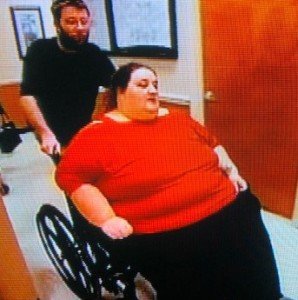
I guess Angie J. never watched “My 600 Pound Life” more than once by the time she decided to get on.
How can Angie J. blame a scale for being wrong when it showed a weight gain?
How dare she accuse Dr. Now of “punishing” her with another weight loss goal?
How dare she call her husband (the only man in her life who apparently hasn’t mistreated her) “pathetic” and a “loser” just because he won’t go to the store in an unfamiliar town and buy her food?
Deranged Childhood Begets Super Morbid Obesity

We all know that Angie Johns had a horrible childhood.
Even though (reportedly) her parents didn’t physically abuse her, she stated that when she told her mother that a family friend had molested her, drug-addict Mama didn’t even defend her. That would cause much more damage than a belt whipping.
But there comes a point in time when a person, who grew up without love, praise, structure and healthy food, must take accountability.
At only 13, Angie slept (with consent) with a 27-year-old and got pregnant (eventually giving the baby away).
Many will say that a 13-year-old should not be blamed for such decisions, being that up to that point, she’d been living in a highly dysfunctional home.
And furthermore, the perv who slept with her got away with it. Angie talked about this “first, real relationship” as though it was perfectly normal for a 27-year-old to have sex with a 13-year-old.
Again, there comes a point when an individual, despite growing up in a painful, train wreck household, must take some responsibility so that her future children don’t suffer – like Desiree (Angie’s daughter) – who’s had two out-of-wedlock kids by age 21.
Angie J. at one point says that she won’t allow her husband, Justin, to be a caregiver because otherwise he’d “cross over” from being a husband.
But go ahead, heap the caregiving duties on Desiree (whose face tells a lifetime of pain) so that she crosses over from daughter to caregiver.
Angie had the money all along to move to Houston.
She whined to Dr. Now over the phone she didn’t have money to move to Houston (which she eventually somehow obtained).
My first thought was, “Stop buying cigarettes and so much food, and you’ll have plenty of money in no time!”
Enablers Fear the Wrath of Angie
Desiree and Justin are enablers, bringing the nearly-bedbound Angie large quantities of junk food.
Being that three-year-old Daisy is living in such an environment, it’ll be easy to understand if one day she’s on the 30th season of “My 600 Pound Life,” referring to the weight loss program as “bullshit,” just like her grandmother did.
Remember Jeanne? She was just nasty. Who didn’t think there could be a worse patient?
Well, Angie J. takes the cake for that. She’s even worse than Steven Assanti. In some ways, anyways.
Each time Angie was given another chance by Dr. Now, she admitted to slipping up on the diet.
But then, during her last chance, she said she had to starve herself and eat only salads (though two slices of bread were sitting nearby) because the diet had not worked.
Angie kept making one excuse after another, ultimately blaming Dr. Now for her failure.
What’s really provoking is that many body positivity influencers insist that you cannot tell a person’s health by their size.
Not only can a person’s size be highly indicative of their health, but so can their voice!
Dr. Now detected drug use simply by Angie’s voice over the phone – and toxicology tests later on confirmed this.
Angie is not only a compulsive overeater, but she’s a heavy smoker (according to the toxicology test) and is on the narcotics bandwagon, also admitting to smoking pot.
She was offered a rehab program by Dr. Now, but rejected even that.
Dr. Now stated that Angie J. will die soon if she continues on her current path.
And because tormented generations tend to repeat themselves, daughter Desiree will continue subjecting her kids Daisy and Karson to a deranged home life.
And if we see Desiree on the 15th season of “My 600 Pound Life,” we won’t have to wonder how she got that way.
Update on Angie J
In the April 14, 2021 airing of “My 600 Pound Life,” Angie’s husband Justin left her — after they had an argument over his relapsed drug problem.
She appears to be of less weight than when she started the program, but has not made any true strides at weight loss.
Because Angie J is now alone in an apartment and has mobility impairment (essentially bound to a wheelchair), she is not able to care for herself, but still wants to be on Dr. Now’s program.
Her neighbor David invited her to stay with him and eventually the two became an item. But oddly, he then booted her out of his home — yet continued maintaining his status as her boyfriend.
The only thing that makes sense is that she was being too demanding and possibly verbally abusive towards him, and he could no longer take it. Nevertheless, David was keeping Angie company in a park while she stayed there with no place to live.
The big question is, why doesn’t Angie check into a homeless shelter? Homeless shelters do not turn people down just because they weigh 500 pounds.
Another big question is why doesn’t her best friend Mandi take her in?
Amazingly, finally, Angie agreed to rehab as recommended by Dr. Now (whom she verbally assaulted while lying in a hospital bed not long before that), for her substance-abuse.
Surprise! Angie was detoxed and was approved for weight loss surgery.
At some point soon after the surgery, David dumped Angie. However, just in the nick of time, a former neighbor of Angie’s, James, invited her to stay at his place for about a month.
For a few months following the surgery she reported feeling ill and unable to hold much food down. She lost 33 pounds during that time, but continued feeling sick, and underwent some tests.
The tests were all negative, and eventually, and she moved to Ohio to stay with her brother, where she reported that she was now beginning to feel normal.
Her final recorded weight was 310. In fact, at the very end of the show, Angie was noticeably smaller than her daughter Desiree — who appeared to be bigger than ever.

Angie is on the right. That’s her daughter Desiree on the left.
Maybe with the massive loss of weight, Angie will also experience a massive loss of her arrogant attitude.
 Lorra Garrick is a former personal trainer certified through the American Council on Exercise. At Bally Total Fitness she trained women and men of all ages for fat loss, muscle building, fitness and improved health.
Lorra Garrick is a former personal trainer certified through the American Council on Exercise. At Bally Total Fitness she trained women and men of all ages for fat loss, muscle building, fitness and improved health.
Why Is Lung Cancer So Difficult to Treat? Surgeon Answers
Lung cancer is one of the most terrifying cancers, one reason being that removing both entire lungs is never an option.
It’s hard to treat which is why the five-year survival rate is only 19 percent – the average when all stages of initial diagnosis are considered.
All lung cancer patients will get a treatment regimen, but the collective prognosis is bleak.
“It’s all about the stage of disease when patients are diagnosed,” says Alex Little, MD, a thoracic surgeon with a special interest in esophageal and lung cancer.
Dr. Little explains, “Roughly about 75% of patients present at initial diagnosis with stage IV (they have metastatic disease) or stage III (regional lymph nodes are involved) disease.
“Few of these patients will be cured, and I think the survival at five years is nearly zero.
“That means only a quarter of patients at diagnosis are in stage I, and are candidates for curative surgery.
“The five-year survival for these patients after surgery is about 80%. I’ve not checked all these numbers but they are reasonably accurate and would result in a five-year survival of all patients of about 19%.”
How Lung Cancer Is Treated for Different Stages – and Why It’s Difficult to Treat for Later Stages
“The challenge is to identify the patients for whom an operation is appropriate and then performing the appropriate procedure,” says Dr. Little.
“There are two aspects to this: staging the cancer and evaluating the patient’s status.
“Staging is the process by which the extent of the cancer is determined. The only reason to operate for lung cancer is the expectation that ALL the malignancy can be removed.
“If any is left—in the lung, lymph nodes or a metastatic site—the cancer will recur and the patient will not have been helped.
“Staging methods—not all are necessary in all patients—include taking a thorough history, performing a physical exam and using a battery of radiologic exams including a chest X-ray, chest computerized axial tomograph (CAT) scan, MRI scan, PET scan and biopsy of lymph nodes.
“A patient with lung cancer remaining after an operation will die of the cancer.
“But, if they respond to any combination of radiation, chemotherapy, immune enhancement or checkpoint inhibitors, they may live several years.”
You might be thinking, “Only several years? Why not 10 or even 20 years?”
It just doesn’t work this way. And nobody knows how far into the future an effective treatment will finally be developed – a treatment so effective that when a person gets the diagnosis of even late-stage lung cancer, the prognosis will be excellent – without losing any parts of their lungs.
Staging Results
“If all cancer is in the lung—no metastases and no spread to lymph nodes—an operation is potentially curative,” says Dr. Little.
The disease may be found in an early stage by accident when someone gets a chest X-ray for an unrelated reason, such as to check for internal damage after a car crash or for chest pain.
“If metastatic disease is found in a distant organ (liver, brain and bone are the most common locations), there is no role for surgery, as all cancer cannot be removed,” continues Dr. Little.
“If there are no metastases, and no lymph nodes are involved, but the tumor is invading the inside of the chest wall (most commonly at the lung apex, called a Pancoast tumor), an operation encompassing the lung and a segment of the chest is potentially curative.
“If there are no metastases, but lymph nodes in the area are involved, multimodality therapy is initiated.
“The patient receives a combination of both radiation and chemotherapy. If the tumor and the lymph nodes respond with dramatic shrinkage, then surgery is added for potential cure.”
Patient Status
The overall health of the patient, prior to treatment, can make treatment success difficult to achieve.
“Patients must be fit enough to tolerate/survive a lung resection,” says Dr. Little. “As most were/are smokers, organs damaged by smoking [including the heart] are evaluated.
“The heart’s status is determined by the patient’s exercise tolerance and, if necessary, function is evaluated by scans and even angiography if necessary.
“Lung function is routinely evaluated by a battery of lung function studies which contrast the patient’s breathing parameters to normal values.
“These studies inform the surgeon how much lung can safely be removed and the patient both survive the operation and have sufficient breathing capacity to expect a reasonable quality of life.
“Depending on the results, the thoracic surgeon may feel an entire lung can be removed if necessary (a pneumonectomy), a lobe is safe to extirpate (a lobectomy, the most frequently performed operation), or only a segment is safe (a segmentectomy, removal of part of a lobe).
“Ongoing success in treating stage IV and III patients has lengthened lives, but cure of these patients is quite rare. So from a curative perspective, treatment is difficult.”
 Alex Little, MD, trained in general and thoracic surgery at the Johns Hopkins University School of Medicine; has been active in national thoracic surgical societies as a speaker and participant, and served as president of the American College of Chest Physicians. He’s the author of “Cracking Chests: How Thoracic Surgery Got from Rocks to Sticks,” available on Amazon.
Alex Little, MD, trained in general and thoracic surgery at the Johns Hopkins University School of Medicine; has been active in national thoracic surgical societies as a speaker and participant, and served as president of the American College of Chest Physicians. He’s the author of “Cracking Chests: How Thoracic Surgery Got from Rocks to Sticks,” available on Amazon.
 Lorra Garrick has been covering medical, fitness and cybersecurity topics for many years, having written thousands of articles for print magazines and websites, including as a ghostwriter. She’s also a former ACE-certified personal trainer.
Lorra Garrick has been covering medical, fitness and cybersecurity topics for many years, having written thousands of articles for print magazines and websites, including as a ghostwriter. She’s also a former ACE-certified personal trainer.
.
Top image: myupchar.com/en
Trouble Swallowing from Esophageal Cancer vs. ALS
Here is a detailed comparison by a surgeon between trouble swallowing from esophageal cancer compared to ALS.
If a person’s health anxiety is tuned more into esophageal cancer, he or she might start suspecting this disease as the reason they’ve been having difficulty swallowing, rather than a neurodegenerative condition.
Comparing the Trouble with Swallowing in Esophageal Cancer to that of ALS
“First, swallowing is a process that starts in the mouth; progresses when the tongue and oropharynx coordinate to propel food from the mouth and into the esophagus,” explains Alex Little, MD, a thoracic surgeon with a special interest in esophageal and lung cancer.
“The esophagus then has to propel the food bolus through the esophagus with peristaltic—sequential—muscular contractions, ultimately pushing it into the stomach,” continues Dr. Little.
The medical term for difficulty swallowing is called dysphagia.
“ALS is a condition of weak muscles, so patients with this disorder have trouble with what is called the oral phase of swallowing,” says Dr. Little.
“They can’t chew, nor can they eject the food from their mouth into the esophagus. If it does get into the esophagus, gravity will eventually move it along.”
When the muscles are atrophied enough from ALS, the patient can no longer take food by mouth.
• The ability to chew is impaired.
• The muscles that push food into the esophagus no longer work.
• At this stage, food will not get into the esophagus – not even applesauce.
“Esophageal cancers fill the inside ‘tube,’ the lumen, of the esophagus,” continues Dr. Little. “Food cannot pass.
“So, patients report they have no difficulty getting food from their mouth into the esophagus—the oral phase of swallowing—but the food hits a roadblock on the way down the esophagus.”
In other words, esophageal cancer doesn’t affect the oral phase of swallowing.
The symptom of dysphagia or “trouble swallowing” shows up on symptom lists for both esophageal cancer and ALS (bulbar onset).
Dr. Little explains, “Both ALS and esophageal cancer patients have dysphagia, but for different reasons and during different phases of the swallowing process.”
In esophageal cancer, “Some [food] may get through initially, but eventually nothing passes, and the patient has to vomit everything back up.”
Key Differences Between the Dysphagia of ALS and Esophageal Cancer
Trouble Swallowing from ALS
• With bulbar-onset disease, there will be other symptoms such as difficulty using the tongue, worm-like undulations of the tongue, slurred speech, strained speech, alteration in speaking pitch, hoarseness and buildup of saliva.
• With bulbar-onset, the trouble swallowing will feel like it’s coming from the throat. There will not be any chest- or neck-area symptoms caused by this.
• “Their dysphagia is difficulty clearing their mouth,” says Dr. Little.
• The feeling of dysphagia will also be present every time the patient swallows throughout the day to clear saliva.
Trouble Swallowing from Esophageal Cancer
• “EC patients have a ‘plug’ in their esophagus,” says Dr. Little. “They have no difficulty clearing their mouth.
“But food in the esophagus meets with difficulty passing the obstruction. Their oral phase is okay. Their dysphagia is during the esophageal phase of swallowing.”
• This means the symptoms of “swallowing” that the patient feels will be at neck level, rather than in the mouth or throat somewhere.
• However, esophageal cancer can cause pain in the throat, whereas ALS won’t.
• “The medical definition of swallowing includes the passage of food through the esophagus and into the stomach — and it’s during that phase that the EC patients have dysphagia.”
• Thus, the patient will feel a stuck feeling of food behind the chest or sternum, and/or in the neck where the esophagus begins.
• Another symptom is burning, pain or pressure in the chest, including when not eating.
“In fact, many of my patients — when asked — would say they had no trouble swallowing — by which they meant they could empty their mouths without any difficulty.
“But when asked what happened next, they would say the food sticks or it won’t pass through. This is dysphagia.”
Additional Symptoms of Esophageal Cancer
• Coughing or hoarseness
• Choking on food, particularly meat and bread
• Unexplained weight loss
Do you have true dysphagia?
Most causes of what seems to be a problem with swallowing are benign. One is laryngopharyngeal reflux disease (LPR).
LPR does not actually prevent food from clearing the throat and being propelled down the esophagus to the stomach. But it can cause dysphagia.
Anxiety is another cause. This is why when a person is chewing and swallowing right at the moment they receive shocking news or see something shocking, they might gag, cough and involuntarily spit out their food (or drink).
But once the alarming moment has passed, there’s no problem clearing the mouth and getting food into the stomach.
A sensation of difficulty swallowing may be present on and off throughout the day, regardless of eating, for someone suffering from LPR or intense anxiety.
If you’re being ravaged by the fear of esophageal cancer or ALS every time you eat, the anxiety WILL make swallowing seem impaired.
Diagnosis Yearly in the U.S.
- About 17,600 for esophageal cancer
- About 5,000 for ALS
SEE A DOCTOR if you have other worrisome symptoms or if symptoms are getting worse.
 Alex Little, MD, trained in general and thoracic surgery at the Johns Hopkins University School of Medicine; has been active in national thoracic surgical societies as a speaker and participant, and served as president of the American College of Chest Physicians. He’s the author of “Cracking Chests: How Thoracic Surgery Got from Rocks to Sticks,” available on Amazon.
Alex Little, MD, trained in general and thoracic surgery at the Johns Hopkins University School of Medicine; has been active in national thoracic surgical societies as a speaker and participant, and served as president of the American College of Chest Physicians. He’s the author of “Cracking Chests: How Thoracic Surgery Got from Rocks to Sticks,” available on Amazon.
 Lorra Garrick has been covering medical, fitness and cybersecurity topics for many years, having written thousands of articles for print magazines and websites, including as a ghostwriter. She’s also a former ACE-certified personal trainer.
Lorra Garrick has been covering medical, fitness and cybersecurity topics for many years, having written thousands of articles for print magazines and websites, including as a ghostwriter. She’s also a former ACE-certified personal trainer.
.
Top image: Freepik.com
Sources
hopkinsmedicine.org/neurology_neurosurgery/centers_clinics/als/conditions/als_amyotrophic_lateral_sclerosis.html
seer.cancer.gov/statfacts/html/esoph.html
Five Ways to Lower Resting Heart Rate without Drugs
If you want to lower your fast resting heart rate without drugs that can cause side effects, there are at least five natural ways to do this. (more…)
Five Ways to Stop Heart Palpitations without Drugs
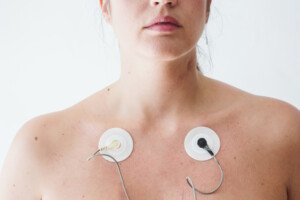
A cardiologist says there are five ways you can stop heart palpitations without drugs.
If you continue having heart palpitations despite having given these five treatment methods a chance, then you should work with your cardiologist to see if perhaps a drug might be your best option. (more…)
Racing Heart vs. Irregular Heartbeat: What’s the Difference?
A racing heart isn’t always irregular, and an irregular heartbeat can sometimes be racing.
It’s important to know what the exact meaning is of these two terms, as they are often indiscriminately interchanged by writers – including those for medical sites. (more…)









